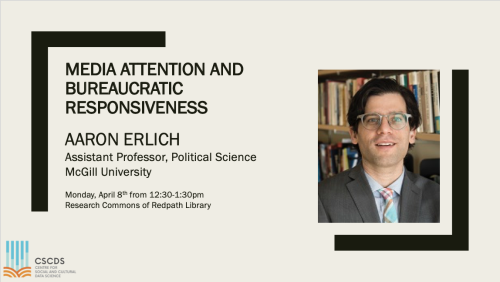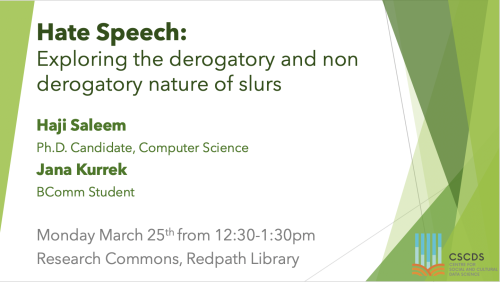CSCDS is delighted to host a monthly speaker series open for anyone to attend. Snacks will be provided. The schedule for Winter 2019 is as follows:
"Media Attention and Bureaucratic Responsiveness"
Aaron Erlich, Assistant Professor of Political Science
Monday, April 8th from 12:30-1:30
Research Commons Room A of Redpath Library Complex (3459 McTavish)
Automated attempts to detect political scandals in media-derived texts have primarily relied on keyword searches to determine when a scandal has occurred. In this project, we introduce a more flexible methodology for identifying anomalous media coverage of government institutions. Our proposed technique is language-neutral, and specifically detects anomalous volumes of news coverage of a government agency using a form of an extreme studentized residual test. We combine this method with an examination of sentiment and scandal-related keywords in news coverage across our identified anomalous and non-anomalous corpora. We then validate our method on a sample of approximately 250,000 Mexican print news articles pertaining to 22 Mexican federal agencies between 2005 and 2016. In doing so, we find that the proposed method unearths a wider variety of political attention than is generally accessed via keyword definitions of scandal within media-derived texts and is predictive in models of agency behavior. The research is funded by Social Science and Humanities Research Council (SSHRC) Grant #430-2018-1069 and Fonds de recherche du Québec – Société et culture (FQRSC) Grant #253243.
Aaron Erlich is an Assistant Professor in the Department of Political Science at McGill University, where he is the Director of DemoTIP Laboratory, a member of the Centre for the Study of Democratic Citizenship (CSDC), and a founding member of the Centre for Social and Cultural Data Science (CSCDS). He completed his Ph.D. at the University of Washington in Seattle.
"Hate Speech: exploring the derogatory and non derogatory nature of slurs"
Haji Saleem & Jana Kurrek
Monday, March 25th from 12:30-1:30
Research Commons Room A of Redpath Library Complex (3459 McTavish)
The use of slurs - derogatory expressions, understood to convey contempt and hatred towards their target - is a common practice on a wide variety of online social media platforms. While slurs have an inherent derogatory force, they can be deployed in both derogatory and non-derogatory fashion. We wish to disentangle the two usages in an attempt to understand the linguistic patterns of hate. Being the atomic form of hate speech, a better understanding of linguistic phenomenon of slurs can provide valuable insight towards understanding hate speech as a whole and could bring us a step closer to building a generalized model of hate speech.

"Follow the Questions: Building breakthrough product research by combining data science and qualitative methods"
Jason Stanley, Design Research Lead at ElementAI
Monday, February 25th from 12:30-2:00pm
Room 232 of Leacock Building (855 Sherbrooke Street West)
For product and strategy development, organizations need to understand human behaviour on different scales, implying different kinds of social investigation. Organizations are hiring more and more data scientists to help with this task, yet few have training in the social sciences or humanities. Where qualitative researchers are involved, they rarely have training or exposure to the methods of data science. Important pieces are missing on both sides. Social scientists stand a chance to fill this gap by learning to work across the methodological and disciplinary divide. Throughout the talk, Jason will talk about some of his own experiences, as well as some of the big opportunities on the horizon.
Jason Stanley is Design Research Lead at Element AI, where he helps the company's product teams identify opportunities for innovation and learn from iterative attempts to address them. He has previously worked as a product leader, data scientist, and researcher for several technology companies, as a policy advisor for the Government of Canada, and as a researcher investigating the use and impacts of technology around the world. He holds a Ph.D. in Sociology from New York University and graduate degrees from Oxford University.
Past Speaker Series
CaPS & Insight present: Career Opportunities in Data Science and Artificial Intelligence
Presentation by: Laureline Arnaud, Insight
Monday, January 28th from 1:30-3:00pm
Laureline Arnaud finished her PhD in neuroscience at McGill early 2018. She is now the Insight’s Data Science Program Director in Toronto. She will give a presentation and Q&A on careers in data science. Scientists and engineers from diverse fields, including physics, astronomy, computational biology, neuroscience, math, statistics, and computer science, are playing key roles in transforming the way companies and public institutions work with data to impact our daily lives. This event will provide a high-level overview of data science in the technology industry and describe the Insight Fellows Program. The session will include time for Q&A, as well as advice for those interested in transitioning to careers in data science and artificial intelligence.
"Beyond Polarization: Using Data Science to Detect Common Cultures on Social Media"
Presentation by: Sunyam Bagga, Andrew Piper, and Derek Ruths
Wednesday, November 21st from 1-2pm
Political polarization has become a global problem. Increasing amounts of evidence point to social media as a driver of polarization, facilitating users' isolation within increasingly homogenous ideological communities. In this project, using the platform Reddit we are developing methods for identifying places of encounter among ideologically opposed users and understanding the kinds of engagement that lead to productive or non-conflictual interactions.

"Algorithms and Bias: How does it work and what can we do about it?"
Wednesday, October 31st from 1-2 pm

The links below provide a brief list of readings that can help form the basis of our discussion.
- Amazon’s Gender Biased Algorithm is Not Alone
- Semantics derived automatically from language corpora contain human-like biases
- Social Media for Large Studies of Behaviour
- Gaydar and the Fallacies of Decontextualized Measurement
- On the (Im)possibility of Fairness

